#TechInHospitality
Explore tagged Tumblr posts
Text
Reimagining Service Robots: The Human Touch in Automation
Service robots have come a long way from being hip devices to becoming necessary assets in various industries. Why? In hospitality and healthcare industries, among others, they are now used to improve our work efficiency and enhance individuals' experience.
Why Service Robots Are Great.
Service robots are dependable. They can do jobs without any vacations, sick leave, or days off. Utilizing robots can be cost-saving as a result of increasing labor costs.
Hospitality: Happier Guests.
Hotel service robots revolutionize the manner in which guests and hotel employees interact. Room service or helping guests with directions can both contribute to an enhanced stay. Voice-hearing robots at check-in can assist guests with instant information about activities around them.
Healthcare: Improved Patient Assistance.
Service robots have transformed healthcare.? Their tasks are to conduct surgeries, carry medical supplies, and take care of patients./ By staying clean and disinfected, hospitals can decrease the possibility of infections as well.
Education and Retail: Easier Operations.
Service robots are now a common sight in schools and stores. Schools let their administrators permit teachers to focus on instruction rather than paperwork. Stores employ robots to guard inventory and aid people in keeping it organized. Why?
Busting Myths About Service Robots.
Robots will be doing the work for us, predicts a mistaken myth.
In reality, service robots are meant to assist people and not displace them. The monotonous tasks are automated to enable human labor to engage in innovative and strategic work.
Myth 2: Robots Are Dangerous.
Modern service robots have smart sensors and safety measures built into them. They have the ability to sense when people are around and adjust their movements accordingly.
The third myth is that robots are not smart.
AI development makes the robot learn and evolve during programming. Why?. They can process large information amounts, which allows them to make good decisions and execute their tasks successfully.
Final Thoughts.
Service robots illustrate the conjunction between human innovation and technology. The emphasis we place on productivity and enhanced experiences is showcased in their application across industries. A future that is better and more productive is possibly guaranteed through a collaboration of humans and robots as we charge on.

#ServiceRobots#HospitalityTech#RobotConcierge#HotelAutomation#RoboticsInHospitality#AIInHotels#SmartHospitality#RobotButler#HotelRobots#HospitalityInnovation#AutomatedService#TechInHospitality#RobotAssistance#FutureOfHospitality#ContactlessService#HospitalityAI#RoboticHospitality#SmartHotelSolutions#DigitalHospitality#AIConcierge
1 note
·
View note
Text

How Self-Service Kiosks Help Crew Members with Daily Operations The magic of a smooth cruise experience isn’t just about happy passengers—it’s also about empowered crew members who work tirelessly behind the scenes. But what if technology could make their jobs easier, faster and more efficient?
That’s where self-service kiosks come in.
✅ Effortless Check-Ins & Work Schedules Crew members can log their shifts, check duty rosters and receive updates instantly via kiosks-no more long queues at HR desks!
✅ Faster Meal & Break Management With thousands of meals served daily, kiosks streamline cafeteria orders, reducing waiting times so crew members can maximize their break time.
✅ Automated HR & Payroll Access Need to check salary details, request time off, or update personal information? Self-service kiosks allow crew members to handle HR tasks independently, saving time for both staff and management.
✅ Quick Training & Emergency Protocols From safety drills to customer service updates, kiosks serve as digital learning hubs, ensuring crew members are always informed and prepared.
✅ Seamless Communication with Management Crew kiosks act as an internal messaging system, allowing teams to report issues, request maintenance and stay connected—even on vast cruise ships. In short, self-service kiosks are transforming how cruise ship crews operate, making every shift smarter, smoother and more efficient!
Would you like to see self-service kiosks in action on your cruise fleet? Let's talk!
#SelfServiceKiosks#CrewMembers#DailyOperations#OperationalEfficiency#WorkplaceInnovation#CustomerExperience#TechInHospitality#Automation#EmployeeEmpowerment#ServiceIndustry#KioskTechnology#StreamlinedProcesses#BusinessSolutions#WorkplaceProductivity#DigitalTransformation#HospitalityTech#SelfServiceSolutions#TeamSupport#OperationalExcellence#CustomerService#EfficiencyBoost#TechForGood#FutureOfWork#KioskBenefits#EmployeeSatisfaction#kiosk#kioskmachine#selfservice#checkin#checkout
1 note
·
View note
Text
Top Visionary Leaders Shaping the Future of Hospitality Industry with Passion and Expertise in 2024
The hospitality industry, once largely reliant on traditional service methods, is undergoing a rapid transformation driven by technological innovation. As customer expectations evolve and digital technologies continue to advance, the sector is increasingly focused on providing enhanced, personalized experiences, improving operational efficiency, and embracing new business models. Ahmad Hafez, Corporate Director of IT at Jannah Hotels and Resorts, is one of the leading figures shaping this transformation. Recognized by The CIO Leaders as one of the “Top Visionary Leaders Shaping the Future of the Hospitality Industry with Passion and Expertise in 2024,” Hafez’s groundbreaking work is redefining the way technology is integrated into the hospitality sector.
The Role of Technology in Hospitality Transformation
The hospitality industry has always been centered around delivering high-quality customer service. However, with the rapid rise of emerging technologies like Artificial Intelligence (AI), the Internet of Things (IoT), Blockchain, and the increasing importance of Corporate Social Responsibility (CSR), the way this service is delivered is undergoing a fundamental shift. Today, technology plays a crucial role in reshaping guest experiences, streamlining operations, and improving the bottom line for hotels and resorts.
For Ahmad Hafez, technology is not just a tool — it’s a driving force behind the strategic evolution of Jannah Hotels and Resorts. As the Corporate Director of IT, Hafez is responsible for defining and implementing the technology strategy at the company, ensuring that every technological decision aligns with Jannah’s long-term vision of innovation and guest satisfaction.
Ahmad Hafez: A Visionary Leader with Expertise and Passion
Ahmad Hafez’s career has been defined by his unwavering passion for technology and its potential to transform industries. With a background in IT strategy, Hafez has spent years honing his skills and knowledge of how emerging technologies can be applied to hospitality. His leadership style combines technical expertise with a deep understanding of customer needs, creating an environment where innovation thrives, and guest satisfaction is paramount.
Under Hafez’s leadership, Jannah Hotels and Resorts has embraced a forward-thinking approach to integrating technology into its operations. From optimizing workflows to improving communication between staff and guests, Hafez’s technology-driven initiatives have helped the company stay ahead of the curve and maintain a competitive edge in the increasingly tech-driven hospitality sector.
Transforming Guest Experience Through Technology
One of the standout achievements of Ahmad Hafez at Jannah Hotels and Resorts is the successful rollout of the company’s guest app. The app is a game-changer in the hospitality sector, as it enables guests to interact with hotel services in a seamless, user-friendly manner. By automating guest requests and facilitating communication between staff and guests, the app enhances overall guest experience and improves operational efficiency.
Bridging Communication Gaps with AI
One of the primary functions of the app is to break down language barriers between guests and hotel staff. With guests coming from all over the world, communication can sometimes be a challenge. The app uses AI-powered translation tools to allow guests to make requests and interact with hotel services without the need for language proficiency. This makes it easier for guests to feel comfortable and valued, regardless of their native language.
In addition to facilitating guest communication, the app also enables guests to make room service orders, book amenities, and even provide feedback, leading to more direct bookings and a more personalized experience. Ahmad Hafez’s vision of merging technology with user requirements ensures that the app aligns perfectly with the needs of Jannah’s guests, creating an enhanced, frictionless experience.
Leveraging AI, IoT, and Blockchain for Operational Efficiency and Security
AI-Powered Personalization
AI has become a transformative tool in the hospitality industry, and Ahmad Hafez is keenly aware of its potential. By integrating AI into the hospitality experience, Jannah Hotels and Resorts is able to deliver highly personalized guest experiences, improving both satisfaction and loyalty. Machine learning algorithms allow Jannah to optimize pricing strategies, ensuring competitive rates that maximize revenue while keeping guests happy.
Moreover, AI enables the company to anticipate guest preferences and behaviors, allowing for highly personalized recommendations and services. Whether it’s suggesting local attractions or customizing room features, AI helps to create an experience tailored to each individual guest, elevating Jannah’s reputation for exceptional service.
IoT and Smart Rooms
The Internet of Things (IoT) is another technological breakthrough that has reshaped the hospitality landscape. With IoT, Jannah Hotels and Resorts has been able to create “Smart Rooms” that offer a truly futuristic experience for guests. These rooms are equipped with sensors and connected devices that allow guests to control everything from room temperature and lighting to entertainment options, all via their smartphones or voice commands.
Beyond convenience, IoT enables predictive maintenance of hotel infrastructure, reducing downtime and ensuring that rooms are always in top condition. By utilizing IoT technology, Hafez has positioned Jannah Hotels as a leader in operational efficiency and guest comfort.
Blockchain for Secure Payments and Loyalty Programs
Blockchain technology is revolutionizing various industries, including hospitality, by offering secure, transparent, and efficient ways to handle transactions. At Jannah Hotels and Resorts, Hafez has overseen the implementation of blockchain-enabled payment systems, ensuring that guest transactions are secure, seamless, and free from fraud.
Additionally, blockchain technology is used to enhance Jannah’s loyalty programs, making them more secure and reliable. Guests can earn and redeem loyalty points with ease, and the transparency of blockchain ensures that there is no risk of fraud or manipulation. This commitment to security and guest satisfaction sets Jannah apart in a highly competitive market.
Overcoming Challenges and Achieving Success
Implementing new technology in the hospitality sector is not without its challenges. Initial costs can be high, and selecting the right technology partners is crucial. Ahmad Hafez faced this challenge when introducing crypto-payments at Jannah Hotels and Resorts. While the regulatory landscape around cryptocurrency can be complex, Hafez worked closely with trusted vendors to ensure compliance with all relevant laws and regulations.
By carefully selecting the right business partners and ensuring that the necessary infrastructure was in place, Hafez was able to dispel any doubts about the credibility of the system. The success of the crypto-payment initiative reflects his ability to overcome technological challenges and create innovative solutions that enhance the guest experience.
Commitment to Corporate Social Responsibility (CSR)
Ahmad Hafez’s work goes beyond just technology implementation; it’s also about making sure that Jannah Hotels and Resorts remains a responsible corporate citizen. Technology, in Hafez’s view, should be used not only to enhance the bottom line but also to support CSR initiatives. Whether it’s through sustainable practices, reducing the environmental impact of hotel operations, or ensuring that the welfare of employees and guests is prioritized, Hafez’s approach to technology aligns with Jannah’s broader corporate values.
Recognition as a Visionary Leader
Ahmad Hafez’s vision and leadership have earned him well-deserved recognition. He was named one of the CIO Leaders’ “Top Visionary Leaders Shaping the Future of the Hospitality Industry with Passion and Expertise in 2024.” This honor reflects his forward-thinking approach to technology and its integration into hospitality services. His work at Jannah Hotels and Resorts is a shining example of how technology can enhance customer experience, streamline operations, and create new opportunities for growth in the hospitality sector.
Conclusion
As the hospitality industry continues to evolve, the role of visionary leaders like Ahmad Hafez becomes increasingly important. By embracing emerging technologies such as AI, IoT, and blockchain, Hafez has positioned Jannah Hotels and Resorts at the forefront of innovation, ensuring that the company remains a leader in customer experience and operational efficiency. His leadership has shown that when technology is merged with passion, expertise, and a focus on human values, it can drive transformative change that shapes the future of the industry.
Ahmad Hafez’s recognition as one of the top visionary leaders in 2024 is a testament to his commitment to transforming the hospitality sector through technology and strategic innovation. His work will undoubtedly continue to influence the way the hospitality industry approaches technology and guest service for years to come.
#AhmadHafez#CIOLeaders2024#VisionaryLeader#HospitalityInnovation#HospitalityTechnology#SmartHospitality#FutureOfHospitality#TechInHospitality#HospitalityIndustry2024#HospitalityTech
0 notes
Text
SAP in Hotel Industry
Using the SAP Hospitality ERP Solution, all of your company’s processes are connected into a hotel organization. The need for hotel management and the use of technology in business operations has significantly increased in a saturated and competitive industry. read more

#SAPinHospitality#HotelIndustryTech#SAPSolutions#HospitalityManagement#ERPForHotels#SmartHotels#TechInHospitality
0 notes
Text
The Art of Modern Restaurant Management: Strategies for Success in Today’s Dining Landscape
Modern restaurant management goes beyond operations, focusing on innovation, technology, and customer satisfaction. Embracing digital tools, employee growth, and industry trends fosters long-term success. In 2025, adaptive managers will thrive by meeting evolving customer expectations, leveraging technology, and promoting sustainability, ensuring efficiency and strong relationships in a competitive market.
#ModernRestaurantManagement#RestaurantInnovation#TechInHospitality#CustomerSatisfaction#DigitalTransformation#EmployeeGrowth#SustainableDining#RestaurantTrends2025#AdaptiveLeadership#FutureOfRestaurants#HospitalityExcellence#RestaurantTech#SustainabilityInDining#CustomerExperience#EfficientOperations#SmartDining#RestaurantSuccess#HospitalityLeadership#CompetitiveEdge#DigitalToolsForRestaurants#ThrivingIn2025
0 notes
Text
Leading Web Development Companies for Hospitality
In today’s rapidly expanding hospitality industry, it’s become very crucial to build an organization's online presence. A reliable and reputed web development company will ensure a seamless digital interface that will help to improve and enhance the customer experience, hence smoothing hotel operations.
Discover, the Leading Web Development Companies in the hospitality sector that will help your business to stay at the forefront of the digital landscape.
0 notes
Text
streamlining hms software by grapes innovative solutions
In the fast-paced world of hospitality, effective management can make the difference between a thriving business and one that struggles to stay afloat. With an increasing demand for high-quality service and operational efficiency, the importance of utilizing advanced technology cannot be overstated. Among the leaders in this field is Grapes HMS Software, which provides comprehensive solutions tailored to meet the unique needs of hotels, restaurants, and other hospitality-related businesses. This article will explore the features and benefits of Grapes HMS Software, demonstrating how it can enhance operations, improve customer experiences, and drive profitability.

What is Grapes HMS Software?
Grapes HMS Software is a state-of-the-art hospitality management system designed to streamline operational processes in the hospitality industry. Built with user-friendliness and flexibility in mind, Grapes HMS accommodates a range of establishments, from small boutique hotels and independent restaurants to large chains and resorts. The software offers modules for various functions, including front desk management, booking operations, billing, inventory management, reporting, and customer relationship management (CRM).
Key Features of Grapes HMS Software
One of the standout aspects of Grapes HMS Software is its extensive suite of features. Here are some of the key components that make this software an indispensable tool for hospitality managers:
1. Comprehensive Booking Management
Grapes HMS simplifies the booking process with its intuitive interface, allowing users to manage reservations efficiently. Users can view availability in real-time, manage online reservations from various platforms, and handle group bookings seamlessly. This feature minimizes overbooking, enhances guest satisfaction, and optimizes occupancy rates.
2. Front Desk Operations
An efficient front desk operation is crucial for any hospitality business. Grapes HMS provides front desk managers with tools for check-in and check-out processes, guest registration, key management, and special requests. This automation leads to quicker service and a better overall experience for guests.
3. Billing and Invoicing
Managing finances in a hospitality context can be complex. Grapes HMS automates billing processes, ensuring accuracy and transparency. The software enables users to generate invoices effortlessly, track payments, and manage accounting tasks. This reduces manual errors and saves time.
4. Inventory Management
Effective inventory control is vital for maintaining profitability in the hospitality industry. Grapes HMS offers tools to track stock levels, manage supplier information, and automate reordering processes. This feature helps to minimize waste and ensure that establishments always have the necessary supplies on hand.
5. Customer Relationship Management (CRM)
Grapes HMS places a strong emphasis on customer experience through its robust CRM capabilities. The software allows businesses to store customer data, track guest preferences, and manage feedback. This information can be used to personalize guest experiences, leading to higher satisfaction and repeat business.
6. Reporting and Analytics
Data-driven decision-making is critical in today's competitive landscape. Grapes HMS provides users with access to a range of reports and analytics tools, offering insights into occupancy rates, revenue, and other key performance indicators (KPIs). This information empowers managers to identify trends, adjust strategies, and make informed operational choices.
7. Multi-Property Management
For larger organizations that operate multiple properties, Grapes HMS offers multi-property management capabilities. This feature allows users to manage different locations from a single platform, ensuring consistency and efficiency across the board. It simplifies operations and provides a unified view of the organization's performance.
8. Mobile Accessibility
In a world where mobility is a priority, Grapes HMS includes a mobile app that allows users to manage operations on the go. This feature ensures that managers can access crucial information and communicate with staff anytime, anywhere. It enhances flexibility and responsiveness to guest needs.
9. Integration Capabilities
To maximize operational efficiency, Grapes HMS can integrate with various third-party applications, including payment gateways, marketing tools, and additional management systems. This versatility allows users to create a customized tech ecosystem that best fits their operational needs.
Benefits of Using Grapes HMS Software
Adopting Grapes HMS Software brings numerous benefits to hospitality businesses:
Increased Efficiency: Automation of key processes reduces the workload on staff, allowing them to focus on providing exceptional service to guests.
Improved Guest Satisfaction: Enhanced customer relationship management leads to more personalized service and a better overall guest experience.
Data-Driven Insights: Access to real-time data helps managers make informed decisions, driving profitability and growth.
Cost Savings: Streamlined operations and better inventory management help reduce waste and cut down on unnecessary expenses.
Conclusion
In an industry where customer satisfaction and operational efficiency are paramount, Grapes HMS Software stands out as a leading solution for hospitality management. By integrating key functionalities, providing valuable insights, and enhancing the overall guest experience, this software empowers businesses to adapt and thrive in a competitive landscape. Whether you are running a small bed-and-breakfast or a large hotel chain, Grapes HMS Software can be the partner you need to elevate your hospitality business to new heights.
By leveraging the capabilities of Grapes HMS Software, hospitality managers can navigate the complexities of their operations with confidence and precision, ultimately leading to greater success and a memorable experience for their guests.
For more click the link below : best hms software in india
#GrapesHMS#HospitalityManagement#HMS#SoftwareSolutions#HotelManagement#RestaurantManagement#TravelTech#GuestExperience#BookingSoftware#InventoryManagement#CustomerSatisfaction#DataAnalytics#MultiPropertyManagement#MobileAccess#BusinessEfficiency#HospitalityIndustry#OperationalExcellence#CheckIn#GuestRelationship#Reservations#Profitability#ServiceExcellence#TechInHospitality#Automation#HospitalityTechnology
0 notes
Text
Ari Motel Discusses the Role of Technology in Modern Hospitality
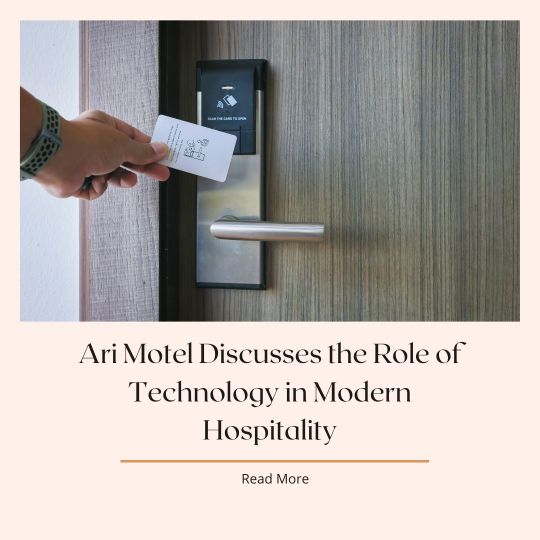
In the rapidly evolving world of hospitality, technology has become a cornerstone for enhancing guest experiences, streamlining operations, and staying competitive. Ari Motel, a seasoned expert in the industry, shares his insights on how technology is reshaping modern hospitality and what hoteliers can do to stay ahead in this dynamic environment.
The Digital Transformation of Guest Experiences
According to Ari Motel, one of the most significant impacts of technology in hospitality is its ability to personalize guest experiences. “Guests today expect more than just a place to sleep,” he says. “They want an experience that feels tailor-made for them.” Technology enables hotels to meet these expectations through various means. For instance, data analytics allow hoteliers to track guest preferences and behaviors, leading to personalized services such as customized room settings, tailored recommendations, and personalized communication before, during, and after the stay.
Mobile apps have also become essential tools in this digital transformation. Guests can now check in remotely, access their rooms via mobile key, and order room service or amenities through an app, all without needing to interact directly with hotel staff. This seamless integration of technology enhances convenience and provides guests with the autonomy they desire.
Streamlining Operations with Automation
Beyond enhancing guest experiences, technology is revolutionizing the back-end operations of hotels. Ari Motel emphasizes the role of automation in improving efficiency and reducing operational costs. “Automation is not just a buzzword; it’s a necessity for modern hospitality,” he explains. Automated systems for booking, billing, and inventory management allow hotel staff to focus on providing exceptional service rather than getting bogged down in administrative tasks.
Moreover, AI-driven chatbots have become increasingly common in handling guest inquiries and reservations, providing 24/7 customer support without the need for human intervention. These tools not only speed up the process but also ensure consistency in service quality.
Enhancing Safety and Security
In the wake of the COVID-19 pandemic, the importance of safety and security in hospitality has never been more pronounced. Ari Motel notes that technology has played a critical role in meeting these heightened expectations. Contactless payment systems, digital room keys, and automated cleaning technologies have become standard practices in many hotels, minimizing physical contact and ensuring a safer environment for both guests and staff.
Additionally, advanced security systems, including biometric access controls and AI-powered surveillance, are being adopted to protect guests and assets. These technologies offer real-time monitoring and can quickly alert staff to potential security issues, thereby enhancing the overall safety of the hotel environment.
Sustainability Through Smart Solutions
Sustainability is another area where technology is making a significant impact. Ari Motel highlights the growing importance of eco-friendly practices in the hospitality industry. “Guests are increasingly conscious of the environmental impact of their travels,” he says. “Technology allows hotels to operate more sustainably while still providing top-notch service.”
Smart energy management systems, for example, can automatically adjust lighting, heating, and cooling based on occupancy, reducing energy consumption. Similarly, digital guest communications can minimize the need for printed materials, contributing to waste reduction.
Staying Ahead in the Competitive Landscape
As technology continues to evolve, Ari Motel advises hoteliers to stay informed and be willing to adapt. “The hospitality industry is highly competitive, and those who fail to embrace technology risk being left behind,” he warns. Continuous investment in the latest technologies and training staff to effectively use these tools are essential for maintaining a competitive edge.
In conclusion
Ari Motel believes that technology is not just an addition to modern hospitality but a fundamental element that drives its success. By leveraging technology, hotels can enhance guest satisfaction, streamline operations, ensure safety, and promote sustainability, ultimately securing their place in an ever-changing market.
#HospitalityTech#GuestExperience#HotelTechnology#DigitalTransformation#SmartHotels#TechInHospitality#HotelAutomation#ContactlessService#SustainableHospitality#InnovationInHospitality#AIInHospitality#FutureOfHotels#HotelManagement#HospitalityInnovation#TravelTechnolog
0 notes
Text
Alfa Software: Smart Solutions for Hotel Management
Discover Alfa Software's smart solutions for efficient hotel management. Our tailored tools optimize bookings, streamline operations, and enhance guest experiences. With intuitive interfaces and powerful analytics, Alfa Software empowers hoteliers to make informed decisions and maximize revenue. From small hotels to large chains, our comprehensive solutions cater to diverse needs, ensuring seamless integration and superior performance. Elevate your hospitality business with Alfa Software's innovative technology, designed to meet the challenges of modern hotel management. Discover how we can transform your operations and exceed guest expectations.
#HotelTech#HospitalitySolutions#TechInHospitality#SmartHotel#HotelInnovation#EfficientHospitality#DigitalHotel#FutureOfHospitality#AlfaSoftware#StreamlinedManagement
0 notes
Text
The Importance of Data Security in Hotel management Software
In today's digital era, hotels handle vast amounts of guest data, crucial for operations and personalization. However, data breaches pose significant risks, including loss of trust, reputation damage, and financial losses. Prioritizing data security in your Hotel Property Management System (PMS) is vital. This involves choosing a reputable provider, implementing strong access controls, regular updates, data encryption, staff training, and having an incident response plan. By prioritizing data security, hotels can safeguard guest information, build trust, and maintain their competitive edge.
#DataSecurity#HotelManagement#GuestPrivacy#Cybersecurity#HospitalityTech#TrustAndLoyalty#ComplianceMatters#SecurePMS#StayProtected#GuestExperience#TechInHospitality#ProtectYourHotel
1 note
·
View note
Text
https://www.zeketrolleys.com/blog/technology-trends-hospitality-industry/
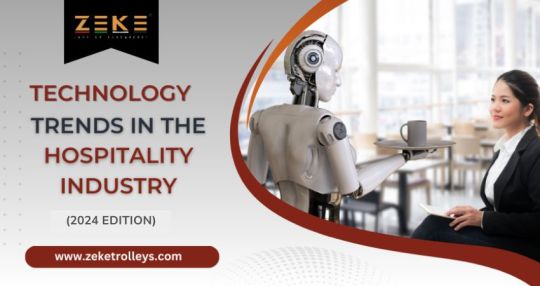
#ZekeTrolleys#TechnologyTrends#HospitalityInnovation#GuestExperience#DigitalTransformation#TechInHospitality#HotelTech#SmartHospitality#TechRevolution
0 notes
Text
Transform Your Restaurant with 11 Strategic Benefits of Online Food Ordering Revolutionize your restaurant's fortunes by embracing online food ordering. Dive into 11 strategic reasons that drive profitability, enhance customer satisfaction, and propel your business forward through this essential investment.
#OnlineFoodOrdering#RestaurantTech#DigitalDining#TechInHospitality#FoodTechAdvantage#ChatGPTDevelopers
0 notes
Text
Tech In Hospitality
Drive through Evolution Using communication devices like headsets and displays for taking orders.
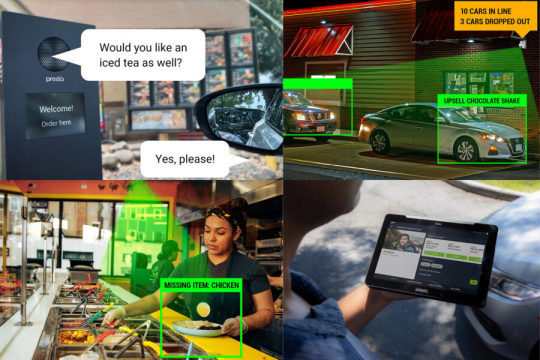
2. Response to guest's safety concern Dear Guest, We Understand your concern about safety or your privacy. But our aim to install these is just to keep the safey of guests & employees as well as our assets. We appericiate your understanding. Thanks and Regards.
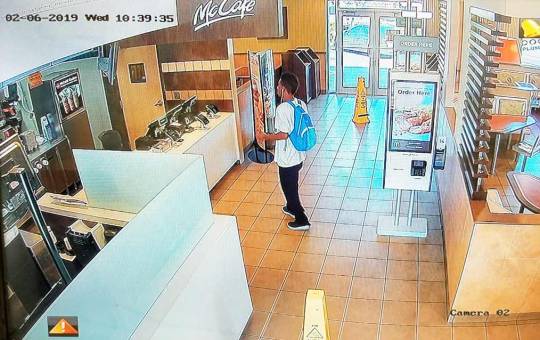
3. Technology in HR department In present we are using technology in HR for analysing Performances, Recruitment process, On-line interviwes. In future HR might use tech to train employees, may use AI for matching job position & job seeker, may use virtual assitants for ease in hiring processes.
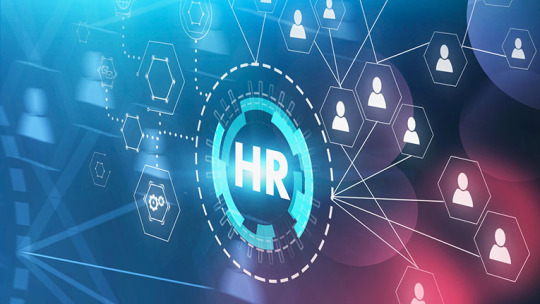
4. Tech in Food Industry Major change is Communication devices and record keeping In next Five years, we can see robotic service, Use of AI installed equipments which will prepare the food by thier own, Creating personalized themes for guests.
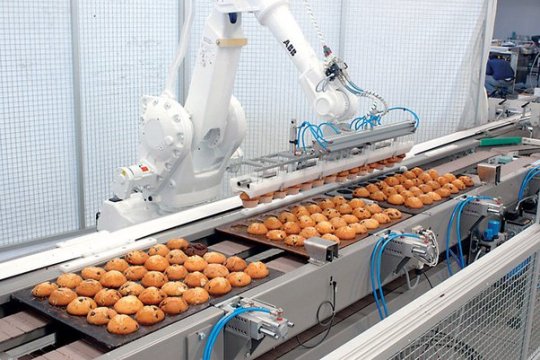
1 note
·
View note
Text
Technology Used in Hotels
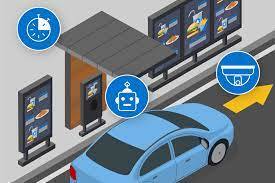
1.Influence of Technology on Drive-Through: Software: Efficient operation in order management systems, digital menu boards, data analytics softwares ensures personalized and faster order processes. Hardware: Transaction processes are simplified while ensuring accuracy through POS terminals, display systems, and payment systems. Communication Devices: Headsets, intercoms, and wireless communication make it possible to interact effectively with a customer; this guarantees the accuracy of orders as well as its swiftness. One could decide that the most important part relates to improving customers’ experiences, increasing efficiency, or boosting income generation.
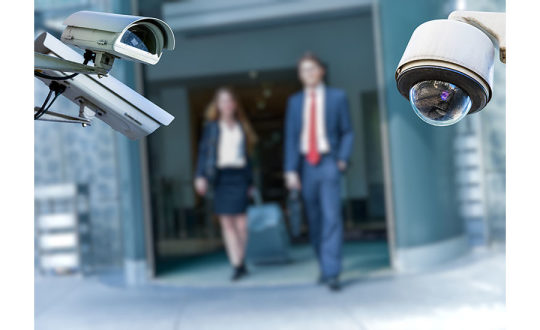
2.Responding to Guest Concerns Regarding Surveillance:
The letter should reassure guests that surveillance is mostly concerned with security and safety, leading to a comfortable atmosphere. Discretionary surveillance which is intended for safeguarding guests and asset’s but never for invasion of privacy.

3.Influence of Technology on Human Resource Management: HR Software: Simplify the tracking of employee information, salaries, benefits and compliance that streamline the associated tasks and cut back on errors. Talent Acquisition: The use of online platforms and applicant tracking systems streamlines recruitment process and can be done quickly thereby reducing hiring cost. Training Automation: Using e-learning platforms and virtual training modules reduces training-related costs.
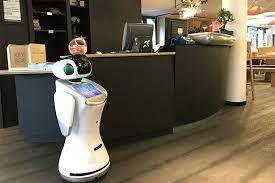
4.Future Influences: AI-based recruitment tools, Virtual working platforms and focus in digital competence and flexibility. Future Changes in Technology Industry in Hotel and Foodservice: The development of technology in the sector, however, would focus on improved customer experience through artificial intelligence driven personalization, augmented reality, and blockchain, respectively. Smart devices integrated in IoT may offer kitchen efficiency, inventory tracking as well as saving on energy costs.
0 notes
Text
Tajinder singh (A00278191)
The introduction of drive-through windows in the quick-service segment heavily depends on technology-related software, hardware, and communication devices. Among these, I believe that software has had the most influence. Advanced order processing systems, integration with inventory management, and efficient communication software contribute significantly to the streamlined and quick service associated with drive-throughs.
Dear [Pavitar Singh],
Thank you for sharing your concerns about being videotaped while dining. Our commitment to safety and security is of utmost importance. The surveillance cameras in place are part of our effort to observe and reduce employee theft, ensuring the safety of our guests and protecting our assets. Please be assured that the footage is strictly used for these purposes, and we appreciate your understanding as we work to create a secure environment for everyone.
Best regards, [Tajinder singh] [General Manager]
Three ways technology has influenced cost control in human resource management: a. Automated Recruitment Processes: Technology streamlines recruitment through applicant tracking systems, reducing time and costs. b. Employee Training Platforms: Online training modules enhance staff skills without significant training-related expenses. c. Time and Attendance Systems: Automated tracking improves payroll accuracy and reduces labor costs.
Future influences on job seekers and employers: a. Remote Work Technology: More flexible work arrangements can reduce office costs for employers and offer job seekers diverse opportunities. b. AI-driven Recruitment: Predictive analytics will match candidates more effectively with job requirements. c. Employee Wellness Tech: Technologies supporting employee well-being can enhance productivity and reduce healthcare costs.
4a. In the next five years, I believe software will change the most in the foodservice industry. Enhanced AI-driven analytics, improved order processing systems, and innovative customer engagement software will redefine how restaurants operate. New uses may include personalized dining experiences through AI-driven menu suggestions, improved customer relationship management software, and increased automation in the kitchen for efficiency and cost-effectiveness.


#DriveThroughTech#QSRInnovation#OrderProcessing#TechInHospitality#SurveillanceTech#AssetProtection#CustomerSafety#CostControlMethods#HRtech#CostControl#TechInRecruitment#FutureOfWork#FoodserviceTech#FutureTechTrends#SoftwareInnovation#TechInCulinary
0 notes
Text
Revolutionizing Guest Experiences: The Role of Technology in Hospitality
Discover how technology is reshaping the world of hospitality, providing guests with unforgettable experiences. #TechInHospitality #HospitalityTech #DigitalCheckIn #SmartRoom #AIConcierge #DigitalDining #CulinaryTech #HotelWiFi #VirtualMeetings
Introduction In the ever-evolving landscape of the hospitality industry, technology has emerged as a transformative force, revolutionizing the way guests experience their stays. From streamlined check-ins to personalized recommendations, the integration of technology has paved the way for more efficient and enjoyable guest interactions. This article delves deep into the role of technology in…
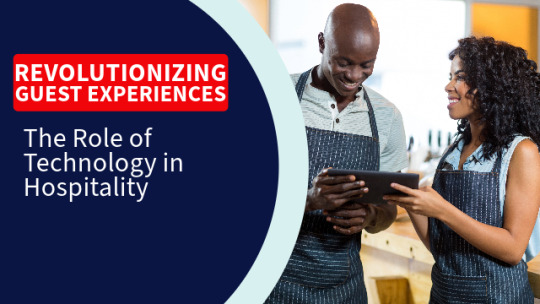
View On WordPress
0 notes